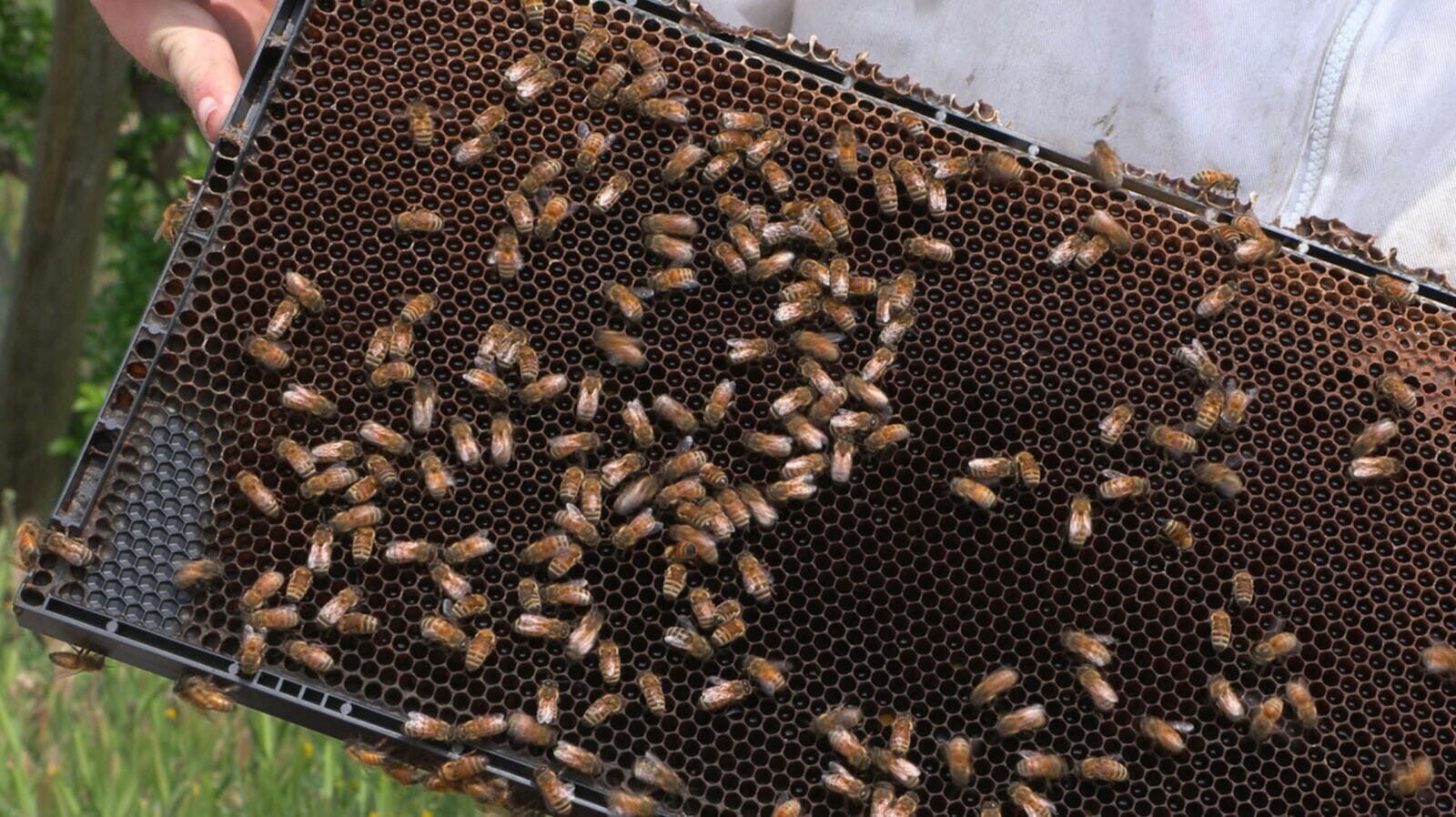On a gloomy Wednesday morning, a buzzing fills the air as the wind brushes the plum trees at 559 Honey Co., which rents hives to farmers who rely on beehives and honeybees to pollinate their fruits, nuts and vegetables.
Throughout California’s Central Valley agricultural communities, rising thefts and vandalizations of beehives have become a worry for farmers, and 559 Honey CEO and beekeeper Ben Zentner is among them. So far this year, 1,169 beehives have been reported damaged or stolen across the state, according to sheriff deputies. Last year, about 500 bee-related crimes were reported.
Zentner’s business in Fresno County has been a victim twice, including in February, when a farmer called to report that something bad had happened to his hives.
READ ALSO: Here’s where most Arizona rattlesnake removals take place
“So I came out and took a look and ended up seeing that all four beehives were knocked over,” Zentner recalled. “They were done maliciously because someone ran into it with a pickup truck or an SUV.”
In the end, two of Zentner’s bee colonies died because of the vandalization, and his equipment was damaged. In total, the vandalization cost him about $700. He never figured out who it was, or why they did it.
Bee thefts also are a problem in Northern California, where Butte County sheriff’s deputy and beekeeper Rowdy Freeman described these thefts as the “perfect crime.” The criminal, he said, often is someone who knows how valuable bees are to California’s farming communities.
Theft, or at least attempted theft, also has been a problem for Zentner.
“The other individual was short on a contract and decided that they were going to get easy money and basically steal a whole entire semi-load of bees,” recalled Zentner, who managed to recover his hives.

Bees are responsible for one out of every three bites of food we eat, according to the U.S. Department of Agriculture. And in California, farmers produce more than a third of the country’s vegetables and two thirds of the country’s fruits and nuts, according to the state Department of Food and Agriculture.
“It’s one beekeeper stealing from another beekeeper,” Freeman said. “It’s very difficult for the general public to be able to distinguish whether it’s a legitimate beekeeper (tending a hive) or it’s a theft in progress.”
These crimes typically occur in the first half of the year, when almond and plum pollination are at their peak.
“There’s over 2 million beehives that are needed to conduct the pollination services in California during that time,” Freeman said.
Beekeepers may steal out of desperation because they experienced a big beehive loss the previous winter, he said. Bees sometimes die off during winter because the colony doesn’t have enough food. Other times, there’s too much moisture in the hives during freezing temperatures, which can kill bees.
“It’s not good beekeepers stealing from other beekeepers, it’s bad beekeepers stealing from the good beekeepers,” Freeman said. “The good guys, they lose hives as well, but they don’t go out and steal them from other people.”
Sometimes, Freeman said, beekeepers are just being greedy and want all the money they can get, especially because the availability of land that’s suitable for honeybees to naturally migrate across has been declining, which has pushed up the cost of renting beehives.
“This year, the average price for a beehive was probably between $210 and $225 per hive,” he said. “Some farmers need a couple hundred. Some farmers need a couple thousand.”
Although such thefts are becoming increasingly prevalent, beekeepers can take steps to protect their bees and hives, such as GPS trackers placed inside hives.
“Individual devices themselves are somewhere in the $100 to $150 range normally,” Freeman said. “And then you pay for those activation services and a monthly fee on those devices. It’s nice, it’s not too much. It’s kind of a small price to pay to help protect your property and your bees.”
Another option is an invisible solution sold by SmartWater CSI that marks equipment and illuminates a bright green using their technology. Beekeepers also have hired private security companies to drive around in rural areas at night during pollination to help deter theft or possibly catch someone in the middle of the crime.
Freeman and other California sheriff’s deputies are working to stop these vandalizations and thefts, but witnesses are rare because these crimes happen in dark, rural areas. And the crooks rarely leave clues behind.
“If I had to guess, I’d say maybe one out of 10 get solved, or where an arrest is made,” Freeman said.
But those that do get caught face serious consequences. Under California law, stealing bees – which are considered livestock – that have the value of $100 or more could be considered felony grand theft.
The crooks who struck Zentner weren’t successful because he had placed GPS trackers inside the beehives before they were stolen. This spared him a huge financial loss.
“Of all the hives that were there, it would have been over $100,000,” he said.
However, beekeepers don’t believe these mitigation tactics will completely stop these types of crimes any time soon.
“It’ll slow it down some,” Zentner said, “but it won’t stop all of it because we can’t have a GPS in everything, but we can do what we can only do.”
Story by Karen Marroquin, Cronkite News




